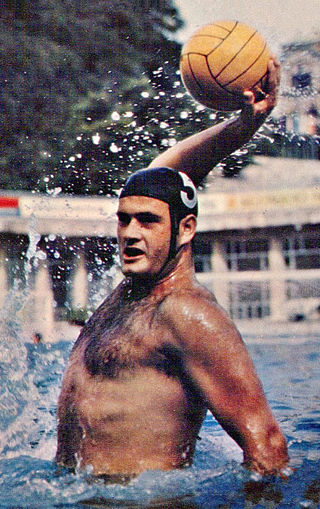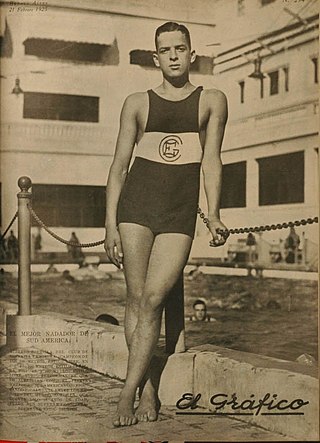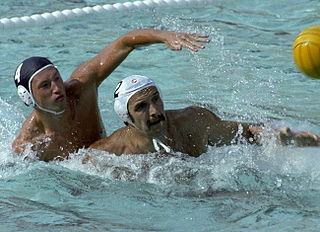Perica Bukić is a Croatian former professional water polo player and politician. He represented Yugoslavia at the 1984 and 1988 Summer Olympics.
Tamás Molnár is a Hungarian former water polo player, who played on the gold medal squads at the 2000 Summer Olympics, 2004 Summer Olympics and 2008 Summer Olympics. He is one of ten male athletes who won three Olympic gold medals in water polo. He made his debut for the national team in 1997, and was named Hungarian Water Polo Player of the Year in 1998.

Egypt, which is represented by the Egyptian Olympic Committee (EOC), competed at the 1996 Summer Olympics in Atlanta, United States from July 19 to August 4, 1996. Twenty-nine Egyptian athletes, twenty-seven men and two women, competed in boxing, handball, judo, rowing, shooting, swimming, weightlifting, and wrestling, but the nation did not win any medals.

Otto Wahle was an Austrian-American swimmer who took part in two Summer Olympic Games and won a total of three medals. Wahle coached the men's US swim team at the 1912 Olympics, and the men's US water polo team at the 1920 and 1924 Olympics.

John Arthur Jarvis was an English competitive swimmer who represented Great Britain in three Olympic Games, and was a well-known amateur athlete of the late 19th century and early 20th century. He participated in Swimming at the 1900 Summer Olympics in Paris and won two gold medals in the 1000-metre and the 4000-metre freestyle events. He also won a gold medal in the water polo tournament.
Peter Anderson Kemp was a British competitive swimmer and water polo player of the late 19th and early 20th centuries. He participated in water polo and swimming at the 1900 Summer Olympics in Paris, and won a bronze medal in the 200-metre obstacle event, and a gold medal in water polo as a member of the British team.

Ernst Heinrich Hoppenberg was a German swimmer and water polo player who competed in the late 19th century and early 20th century in the 200 metre events. He participated in Swimming at the 1900 Summer Olympics in Paris and won two gold medals in the 200 metre backstroke and 200 m team race for Germany.

Mirko Sandić was a Serbian water polo player who led Yugoslav teams to a gold medal at the 1968 Summer Olympics and a silver medal at the 1964 Summer Olympics. He also competed in the 1960 and 1972 Olympics where his teams placed fourth and fifth, respectively. He was given the honour to carry the national flag of Yugoslavia at the opening ceremony of the 1972 Summer Olympics in Munich, becoming the twelfth water polo player to be a flag bearer at the opening and closing ceremonies of the Olympics. Between 1958 and 1974 Sandić played more than 235 matches for the Yugoslav national team contributing 250 goals.
Arthur G. Robertson was a British water polo player. Robertson was a member of the Osborne Swimming Club of Manchester, which fielded the winning team. The International Olympic Committee credits him with a gold medal in water polo at the 1900 Summer Olympics, but this is incorrect as sources contemporary to the Games do not mention him as being part of the squad.

George Wilkinson was an English water polo player who competed at the 1908 and 1912 Summer Olympics representing Great Britain. He was in the Hyde Seal team when he won the Olympics. Hyde Seal are a Manchester team. He was part of the British water polo team and won two gold medals. The International Olympic Committee credits him with a third gold medal from the 1900 Games, but this is incorrect as he was in England during the tournament.
John Henry "Rob" Derbyshire was an English freestyle swimmer and water polo player from Chorlton, Lancashire, who competed in the 1900 Summer Olympics (maybe), 1906 Intercalated Games, 1908 Summer Olympics and 1912 Summer Olympics. He and Alice Derbyshire founded swimming clubs in Hammersmith.

Victoriano Alberto Zorrilla was an Argentine swimmer who competed in the 1924 Summer Olympics and in the 1928 Summer Olympics where he became the first South American to win an Olympic swimming gold medal.
Zdravko "Ćiro" Kovačić was a Croatian water polo player who competed for Yugoslavia in the 1948 Summer Olympics, in the 1952 Summer Olympics, and in the 1956 Summer Olympics.

István Antal Szívós, also known as István Szívós Jr. was a Hungarian water polo player. He competed in four consecutive Olympics in 1968–1980 and won a medal in each of them, becoming one of eight male athletes who won four or more Olympic medals in water polo. He also won six gold or silver medals at world and European championships and nine national titles. Between 1966 and 1980 he played 308 international matches for Hungary. In 1996 he was inducted to the International Swimming Hall of Fame, one year earlier than his father István Sr., who won Olympic gold medals in water polo in 1952 and 1956.
The Championnat de France de water-polo is the premier category in the league system for water polo clubs in France. The men's championship was founded in 1896 by the French Athletic Sports Societies Union. Since 1921 the competition is organized by the newly founded French Swimming Federation. In 1983 the women's championship was founded.
Eric Robinson was a British water polo player who is credited with a gold medal in the 1900 Summer Olympics. Robinson was a member of the Osborne Swimming Club of Manchester, which fielded the winning team. The International Olympic Committee credits him with a gold medal in water polo at the 1900 Summer Olympics, but this is incorrect as sources contemporary to the Games indicate that he was in England too soon after the tournament to have been in Paris.
William Lister was a British water polo player who is credited with a gold medal in the 1900 Summer Olympics. Lister was a member of the Osborne Swimming Club of Manchester, which fielded the winning team. The International Olympic Committee lists Lister as a gold medalist in the event, but this is incorrect, as he died two weeks before the Games.
Josef Karl Hans Aniol was a German swimmer. A member of the Berliner Swimming Club Otter, he competed in the men's underwater swimming event and the water polo at the 1900 Summer Olympics.

Jean Raymond Henri Thorailler was a French male water polo player. He was a member of the France men's national water polo team. He competed with the team at the 1912 Summer Olympics and 1920 Summer Olympics. Thorailler was given the honour to carry the national flag of France during the opening ceremony of the 1928 Summer Olympics in Amsterdam, becoming the fourth water polo player to be a flag bearer at the opening and closing ceremonies of the Olympics.














